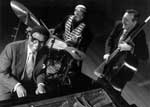
Billy Taylor Trio
|
|
BILLY TAYLOR TRIO & METTA QUINTET
2nd Annual Pittsfield City Jazz Festival
Colonial Theatre
Pittsfield, MA
October 14, 2006
by J Hunter
The Colonial Theatre is a big piece of Pittsfield's heritage. It was a major player on the circuit up until the Depression, presenting everyone from Maude Adams to Eubie Blake; in 1937, it re-opened as a movie house, showing films that are an integral part of the Turner Classic Movies catalog. Pictures and posters from both eras are on display in the lounge area that is a small part of the stunning refurbishment that began the Colonial's third life as a performance venue.
The theatre itself is wonderfully intimate, spreading about 500 seats over three levels. The turn-of-the-century art work and facades can't be adequately described in this small space, and the plush red curtain that concealed the stage is a touch you don't see outside of a Broadway theatre. The Pittsfield City Jazz Festival has a delightful new home, which will soon be presenting artists ranging from Nneena Freelon and Arlo Guthrie to Audra McDonald and the Kronos Quartet.
To its credit, Pittsfield Jazz isn't content to just throw up three nights of concerts and be done with it. Like many festivals, they incorporate jazz education into the mix, bringing the music to the community at large. Saturday's schedule included a Berkshire Museum panel discussion on the Music Inn (a Lenox jazz resort that did business in the 50s) and an open rehearsal/master class by T.S. Monk. Local high school students were treated to a multimedia presentation on the history of jazz by the New York City organization JazzReach. The Metta Quintet - JazzReach's member ensemble - opened the festivities at the Colonial Friday night.
I was looking forward to hearing something from Metta Quintet's new disc, Subway Songs (Sunnyside), which features music inspired by the New York subway experience. Unfortunately, their one-hour set was nothing but standards, which fit the zeitgeist of the weekend but left me mildly disappointed. That said, I have no argument with the way those standards were performed. The cadre of young players (led by drummer/JazzReach founder H. Benjamin Schuman) negotiated the labyrinthine changes of Ellington's “Caravan” with practiced ease, and their fire-breathing rendition of Wayne Shorter's “Charcoal Blues” had the crowd on their feet at the end. Trumpeter Riley Mullins (late of Lincoln Center Jazz Orchestra) blew with power and precision, and teamed with ex-Ray Charles tenorman Keith Leftis to form a heavyweight front line.
Too often, jazz education is handled the way English teachers taught Beowulf back in the day: Shoving it down your throat while screaming, “THIS IS GOOD FOR YOU!” Billy Taylor's educational method is as smooth as his well-known voice and velvet-glove playing style (neither of which has dimmed with retirement). He rarely introduces songs; instead, he presents them as riddles for his audience to solve: “What would happen if…” or “Let me see what I can do with this…” He prefaced a gorgeous solo turn on “All The Things You Are” by saying, “I didn't get to warm up back there, so I'm going to do it out here.”
Too many “legends” back themselves with deservedly unknown players who defer to their leader and hide in plain sight; Taylor brought along Winard Harper, who (when compared to the conservative Taylor) looked like a kid who snuck backstage and talked his way behind the drum kit. Far from overwhelming the proceedings, Harper was the perfect foil, adding nuance here, energy there, and having a terrific time all the while. He was practically dancing during “One For The Woofer”, a piece Taylor chose as a feature spot for steady-going bassist Chip Jackson, and Harper's brushwork on “His Name Was Martin” added just the right texture to Taylor's hushed tribute to Martin Luther King. Taylor let Harper spectacularly loose on “Titoro”, and then brought the set back with his gospel-laced signature tune, “I Wish I Knew How It Feels To Be Free.”
Taylor does jazz education the way it should be done: Not as a way to handcuff you to a particular genre or era, but as an introduction to the infinite colors of a musical form that looks back but keeps moving forward. His is one class I'll never cut.
J HUNTER is a former announcer/producer for radio stations in the Capital Region and the Bay Area, including KSJS/San Jose (where he was Assistant Music Director/Jazz programming), Q104 WQBK/Albany, and WSSV/Saratoga. He has also written music and theatre reviews for the Glens Falls Chronicle. He currently resides in Clifton Park.
|

